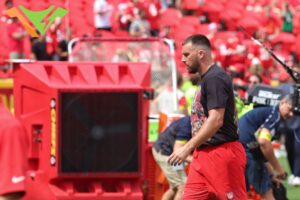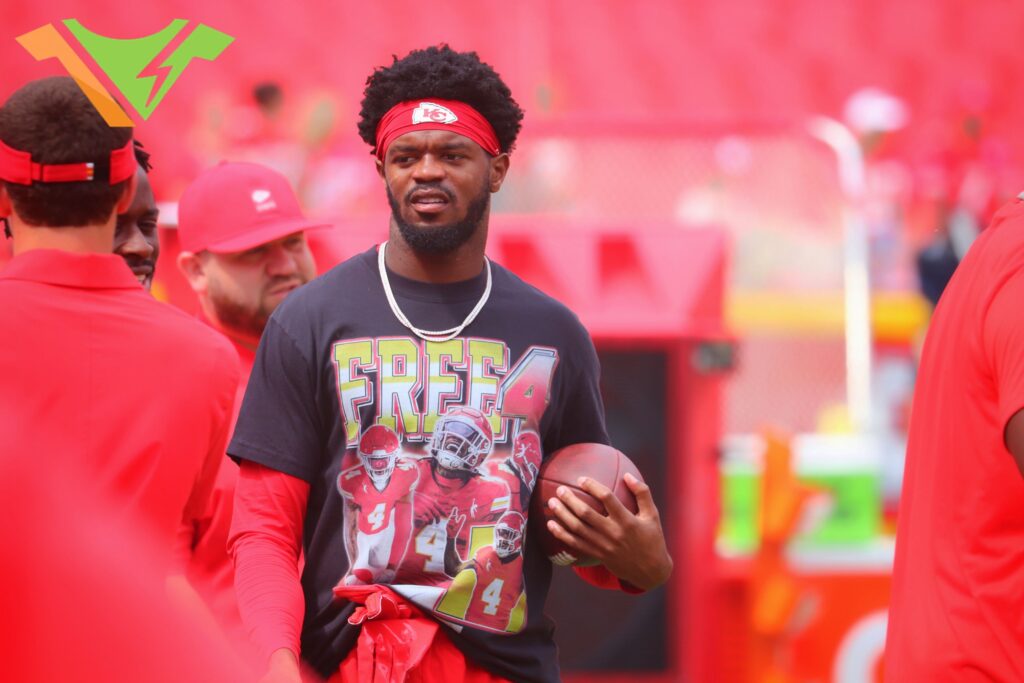News
“Chiefs Coach Andy Reid on the ‘Free 4’ Shirts for Rashee Rice — Because Multiple Chiefs Players Wore Shirts in Support of Suspended Teammate Prior to Their Home Opener Against the Eagles Sunday”
Right before the Kansas City Chiefs’ home opener against the Philadelphia Eagles, several Chiefs players—most visibly Travis Kelce and Tyquan Thornton—wore pregame warm-up shirts emblazoned with “Free 4”, bearing images of their suspended teammate Rashee Rice in his No. 4 uniform. The gesture immediately drew attention, social media discussion, and criticism, raising questions: What are these shirts exactly? What do they mean? And what did head coach Andy Reid have to say about this public display of support?
In short: The “Free 4” shirts are a show of solidarity. Multiple Chiefs players wore them. And Andy Reid downplayed the narrative—saying it’s about supporting a teammate, not about challenging league discipline. But the incident exposes deeper tensions around accountability, loyalty, and how teams manage off-field controversies in the public eye.
1. Who Is Rashee Rice, And Why Is He Suspended?

To understand what’s going on, it’s vital to know the background:
-
Rashee Rice is a wide receiver for the Kansas City Chiefs, drafted in 2023 (second round) who made a big impact during his rookie season.
-
In April 2024, Rice was involved in a high-speed car accident on a Dallas highway. He allegedly was racing a sports car (alongside another vehicle) at speeds of around 119 miles per hour. The crash resulted in a multi-car collision that injured several people.
-
His legal case resulted in guilty pleas on two third-degree felony charges: collision involving serious bodily injury and racing on a highway causing bodily injury. He was sentenced to five years’ probation and 30 days in jail, the jail time to be served intermittently during the probation period.
-
The NFL suspended him for six games under the league’s personal conduct policy. As a result, he is currently ineligible to play, and his first possible return is projected for after those six games.
Thus, when the Chiefs players showed up pregame in “Free 4” shirts, it came in the midst of both legal and league consequences, making the gesture a public expression of support.
2. The Incident: “Free 4” Shirts at Home Opener
Here’s what was seen and what drew attention:
-
Before the Chiefs’ game vs. the Eagles on Sunday (their home opener), Travis Kelce and Tyquan Thornton were among those wearing the “Free 4” shirts during warmups. These shirts had Rice’s photo (in his Chiefs uniform) with the slogan “Free 4”—a play on his jersey number (4).
-
The shirts were visible enough that fans and media noticed, calling out the apparent message: support for their suspended teammate. Some lauded the loyalty; others criticized the timing and implications.
-
Social media had reactions ranging from understanding (“He’s part of the team, they care about him”) to disagreement (“He broke rules, they’re glorifying poor behavior”) and concern about sending the wrong message.
3. Andy Reid’s Response: “They Love the Kid”
When asked about the shirts on Monday, head coach Andy Reid offered a relatively simple explanation:
-
He said he did not see the shirts during the warmups himself initially.
-
Reid emphasized that the players wore them to support Rice, expressing that they “love him” and feel for him while he’s sitting out. It is, according to Reid, just that. No statement against the NFL, no protest, no defiance—just support.
-
“I know these guys love Rashee, and they feel for him sitting out here. I think it’s no more than that.” Reid said. “They want him to feel part of it in their own way.
-
Reid downplayed any notion that the gesture was a rebuke of league policy or discipline. Rather, he described it as a personal display of solidarity among teammates.
Thus, in Reid’s framing, the “Free 4” shirts were less about making a public statement about suspension policies, and more about players trying to uphold a sense of teammate unity.
4. Public Reactions & Criticism
The gesture hasn’t been without controversy. Multiple angles of pushback have emerged:
-
Criticism from media and fans: Some argue that wearing the shirts is inappropriate given Rice’s felony convictions and legal consequences. They believe supporting someone in this context should be more private. Critics seem to say: solidarity is fine; public displays carry messaging.
-
Social media backlash: Observers questioned whether this was a tacit challenge to league discipline. Others suggested it might normalize or minimize the seriousness of Rice’s actions—especially with images of injuries in the crash.
-
Supporters argued that Rice has expressed remorse. Some believe teammates showing solidarity is a natural part of team culture—especially when someone is going through a difficult time. There is a sense among many that suspension and legal consequences don’t erase a person’s place on the team or in the locker room.
5. The Role of Team Culture and Loyalty in Sports
What this incident sheds light on is broader themes in professional sports:
-
Team loyalty often drives gestures like this. Players frequently build strong bonds—on and off the field. They train together, travel together, compete for the same goals. When one teammate goes down (for injury, suspension, or legal trouble), others often try to show support.
-
The tension between personal conduct and public accountability. Professional leagues, including the NFL, impose suspensions, fines, and conduct policies in part to uphold images and standards. But a player’s offline behavior—or off-field legal issues—doesn’t erase their relationships within the team. The “Free 4” shirt reveals that tension in real time.
-
Media and fan expectations are different: fans want accountability; players want empathy. The media often scrutinizes public gestures more than private ones. In some cases, fans expect a player who has erred to be “punished” in public perception, not just by the league. The shirt puts all these expectations into the spotlight.
6. Legal, Ethical, and Image Implications
There are consequences, or potential consequences, from this kind of visible support:
-
Image Management: The Chiefs organization now must balance showing empathy with upholding league rules, public expectations, and their own reputation. It’s a delicate dance: appearing too dismissive of the suspension could lead to criticism. Appearing too punitive could alienate players.
-
League Policy Sensitivity: The NFL has strict rules around conduct, and suspensions are part of that framework. Any gesture perceived as undermining suspension risk being interpreted as disrespect to those policies.
-
Ethical Questions: Is it appropriate to publicly support someone who’s pled guilty to felony charges? Supporters say yes; others say that visibility matters: it’s not just what one feels but what one broadcasts. The ethical question is whether solidarity should happen publicly, or behind closed doors.
7. Comparisons: When Teams Show Support in Contentious Situations
The Chiefs are not the first team in sports to have teammates wear shirts or make public gestures for suspended or otherwise penalized players. Examples from other teams, leagues, or times provide context:
-
In many cases, players have worn T-shirts honoring a player who is injured or dealing with personal tragedy. Rarely, however, do these gestures happen during a disciplinary suspension that involves legal wrongdoing.
-
The NFL itself has had to discipline and manage optics around players whose off-field conduct conflicted with league policies. Sometimes teams distance themselves; sometimes they support quietly. This Chiefs instance is relatively public.
These comparisons show that the “Free 4” shirt is part of a continuum, but stands out because of how recent, serious, and legally weighted Rice’s case is.
8. Possible Repercussions
Looking forward, several potential outcomes or follow-ups could happen:
-
Internal discipline or messaging: The Chiefs organization may discuss with players how to express support in ways that don’t create PR risk or appear to challenge league discipline.
-
League scrutiny: The NFL might monitor if this becomes a trend or if gestures like “Free 4” get treated as organized resistance to conduct policies.
-
Fan reaction affecting brand relationships: Sponsors, fans, and broader public opinion might judge the team and its stars more harshly. Some may see the gesture as insensitive; others will see it as loyalty.
-
Rice’s return and reintegration: How the team handles Rice’s return—both on media interactions and in team culture—will likely be shaped by this moment. If the team already shows public support, reintegration may be smoother internally; externally, expectations will be high for accountability.
9. What Andy Reid’s Statement Reveals
Reid’s statement is important for several reasons:
-
He frames the shirts as personal, emotional rather than political or adversarial.
-
He tries to defang the backlash, emphasizing that the gesture is about inclusion: “…they want him to feel part of it in their own way.”
-
Reid’s distancing from the gesture—saying he didn’t see it at the moment, that it’s nothing more—is consistent with leaders trying to balance discipline with team unity.
In effect, it reveals how coaches often must play both sides: supporting players as human beings, while also upholding organizational and league rules.
10. Broader Implications: Sports, Suspensions, Support, and Culture
This situation touches on several broader themes:
-
How society treats consequences vs. forgiveness: In sports, players are often publicly judged for off-field behavior. But they also have communities that care about them, and fans/teammates who believe in redemption. The “Free 4” shirts fall into that space between condemnation and compassion.
-
Public expectation of athletes: Because athletes are public figures, their actions—both good and bad—are amplified. Every gesture, even a warm-up shirt, is subject to interpretation. The optics matter.
-
Mental health and isolation: Suspended players can feel disconnected. Wearing symbolic shirts is one way teammates try to maintain connection. For many, being apart from the team physically and socially is a hardship, so symbolic gestures matter.
-
Precedent for future conduct and reactions: How the Chiefs handle this moment may set expectations for how other teams respond when their players face legal or disciplinary sanctions. The balance between punishment and human support becomes a standard.
Conclusion
The “Free 4” shirts worn by multiple Chiefs players ahead of their home opener against the Eagles on Sunday are more than just warm-ups—they’re a flashpoint. They highlight loyalty, solidarity, and the messy space where legal wrongdoing, league discipline, public opinion, and personal relationships collide.
Coach Andy Reid’s message was clear: this was about teammates supporting one of their own—not about contesting NFL policy. But the reaction from fans, media, and other observers shows just how sensitive these situations are in modern sports culture.
Rashee Rice is suspended. He’s facing legal consequences. But the Chiefs’ players wearing “Free 4” shirts make visible something less often acknowledged: that behind every suspended name is a person, sometimes a friend, often someone people believe in, want to include, even while accepting responsibility.
The real test will come when Rice’s suspension ends: how the team embraces him back, how they balance acknowledging the past with moving forward, and how the “Free 4” moment ages in the broader narrative of accountability, forgiveness, and team identity.

